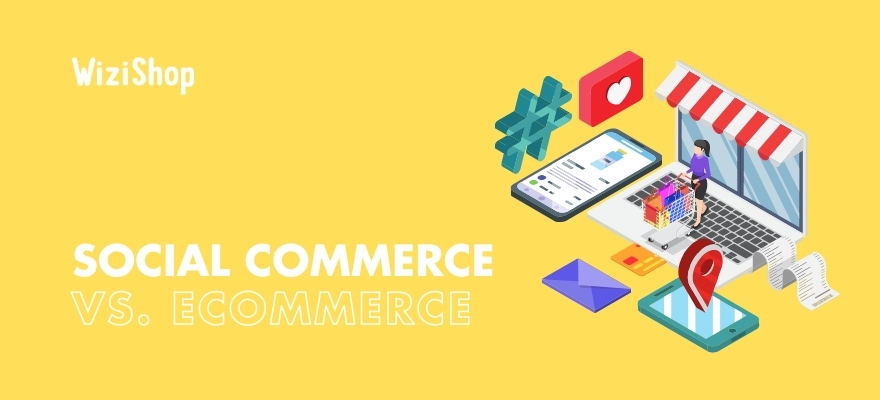While most people are familiar with traditional commerce, they may not know as much about social commerce and ecommerce. These are increasingly relevant to many business models today, and they have standout features and benefits that are important to understand.
Their differences may impact your own business model as well as your marketing efforts and the customer experience.
For some businesses, two or all three commerce methods are blended for a comprehensive approach toward reaching consumers and facilitating sales.
The specific commerce methods that are right for your business will be based on numerous factors, including customer demographics, product types, and others.
With the future of ecommerce indicating that social shopping is on the rise, it’s important to determine if social commerce is a good fit for your brand.
What is ecommerce?
With traditional commerce, a customer visits a physical store and browses through racks and shelves.
In contrast, with electronic commerce (ecommerce), a customer browses through photos and product descriptions. Also known as internet commerce, it involves the sale of products and services online.
What is social commerce?
Online shopping is generally an independent activity. The traditional shopping experience, such as in a mall, could be an independent or social activity. For example, you could choose to go shopping in a traditional store with a few friends or family members.
Social commerce is a happy blend of ecommerce and traditional commerce. Here, the shopping experience takes place on social media platforms. Business owners can use sites like Facebook or Instagram for ecommerce activities and to offer customers a better user experience.
Social commerce enables online shoppers to communicate with others about products and services, share info about special promotions, and more through social platforms.
However, the information communicated about products, services or specific businesses may be positive or negative. The business has minimal control over the message.
How do ecommerce and social commerce differ?
You can see that both ecommerce and social commerce are digital experiences for the buyers and sellers. Nevertheless, they offer unique benefits and experiences to both parties.
A deeper look at their differences will clarify their pros and cons. This will help you to decide which methods are most practical for your business.
Where purchases are made
Ecommerce websites usually have a shopping cart feature. Customers simply peruse the website to find merchandise that they are interested in.
The shopping experience is concluded when the customer finalizes the purchase of all items in the shopping cart and makes arrangements for shipping.
With social commerce, transactions may be facilitated through social media platforms or on the seller’s website. The leading social media platforms that are used for online commerce have easy-to-use platforms that require minimal setup on the part of the business owner.
Before setting up service through these platforms, carefully review the fine print to learn about fees, restrictions, and other critical factors.
Customer engagement
Customer engagement during the transaction is usually relatively minimal with ecommerce. This is because shoppers usually act alone to explore merchandise and to make a selection.
After people buy an item, however, the business may engage them through loyalty programs and other efforts.
Social commerce actively engages shoppers during the purchase experience. This can occur since customers have the ability to communicate with each other, such as about quality and features.
In many cases, shoppers can interact with store staff online as well. While the social commerce experience is more involved, it may lead to a higher customer satisfaction rating if the visitor has a good experience initially.
Customer recommendations
Customer recommendations and reviews play a solid role in the online sales experience. Reviews enable shoppers to learn about features, quality, and other important factors directly from others who’ve already made a purchase.
Through an ecommerce website, users can easily read reviews on specific products before finalizing their buying decision. This can help customers to make a selection with a higher degree of confidence.
Customer recommendations involve two-way communication in social commerce.
For example, if a user is looking for a product that meets a specific need, the user’s query may quickly be met with numerous recommendations. Of course, these users may also have access to written reviews that other customers share on social media before they make a final buying decision.
Pre-purchase relationship with customer
In many cases, site visitors may have questions about a product before finalizing a purchase. In a traditional store environment, the customer would simply locate a salesperson to get the information needed to finalize his or her selection.
In an ecommerce environment, however, the online shopper must make a more significant effort to reach the business via email, chat or phone. Social commerce lays the foundation for easier pre-purchase communication with customers.
The traditional shopping experience generally offers the maximum opportunity for more personalized interactions with consumers. It’s usually more difficult for brands to offer people the same level of service on the web via ecommerce platforms. However, social commerce falls somewhere in between the two.
Brand promotion
Brand promotion and fostering brand loyalty begin with the first contact with the customer. They then extend through features such as loyalty programs, content creation, future buying experiences, and more.
Through ecommerce and social commerce, the business establishes the brand image by creating positive product descriptions, a memorable logo, and other types of online experiences. Social commerce notably adds onto the development of brands by facilitating easy two-way communication throughout the buying experience.
With both options, the business is able to gather personal contact information from those who complete transactions. This allows for ongoing brand development through email marketing and social media marketing campaigns.
Both platforms also enable you to gather feedback about the customer experience. This means that the business can address concerns and make improvements to products, services, and processes as needed.
Insights on how and when to adapt product selection
The ability to know when and how to adjust your store’s product selection is vital to the optimization of profits and to your business’s longevity.
To obtain these insights through ecommerce platforms, you must utilize advanced data collection methods. Careful analysis and even the solicitation of customers for feedback may be required.
The experience of gathering and analyzing data is different for social commerce. Platforms like Facebook and others enable you to monitor and measure what the masses are saying about a product or about the business as a whole.
By monitoring insights offered through social platforms, you can more effectively adjust your product line or service offerings.
Rewarding customer loyalty
Both social commerce and ecommerce facilitate the establishment of an effective customer loyalty program.
Different from traditional commerce, both of these digital methods enable you to easily gather customer contact details and information on purchases. You can then reach out to loyal customers with exclusive offers.
The primary method of communication through ecommerce is via a direct email marketing campaign. Social commerce can also use email marketing campaigns, but it adds an important communication method.
For customers who’ve connected with the business on social media platforms, communication via these channels is another option.
Conclusion
It’s no secret that social media benefits ecommerce in all kinds of ways. Establishing a presence for your business on at least one social media platform is pretty much a necessity today.
It makes sense then that ecommerce and social media would become even more intertwined in the form of social commerce.
As it’s clear that social commerce and ecommerce both have pros and cons, how do you determine which solution is ideal for your online store?
Because each business is unique, there isn’t a one-size-fits-all answer to this question.
Fortunately, you don’t have to choose just one option!
With social media’s role in ecommerce increasing in importance rapidly, many brands find that combining social commerce with their ecommerce endeavors is an excellent recipe for boosting their sales.










